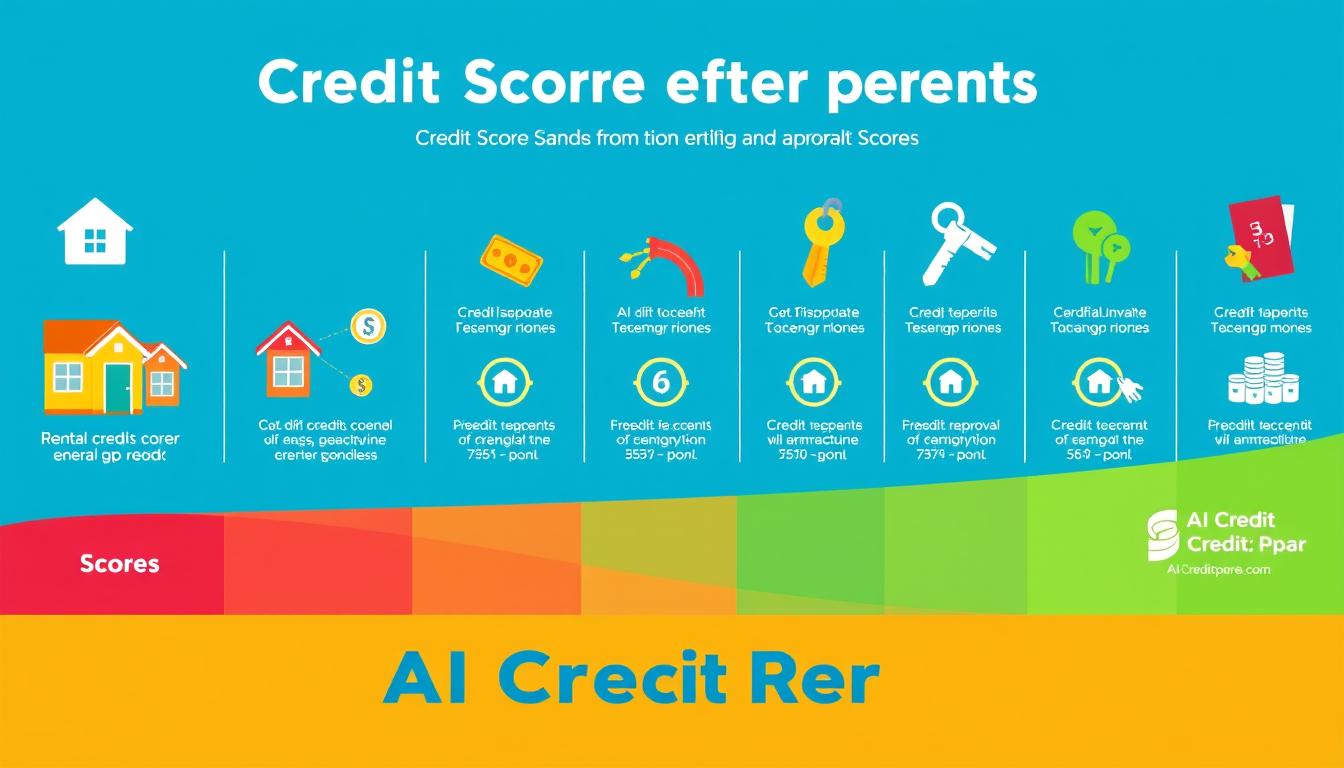Renting a home involves more than finding the perfect property. Landlords often check a potential tenant’s creditworthiness. Knowing the credit score requirements can boost your chances of getting your ideal rental.
Credit scores between 600-700 are typically needed for rental approval. However, landlords also consider income, job history, and past rental experiences. Improving your credit and creating a strong application can increase your chances.
Understanding your credit report is crucial. Address any issues to meet rental requirements. Some landlords may use alternative screening for borderline credit scores.
Key Takeaways
- Landlords typically require a minimum credit score for rental approval, often in the range of 600-700.
- Factors like income, employment history, and rental history also influence a landlord’s decision.
- Improving your credit score and building a strong rental application can increase your chances of securing a rental.
- Understanding your credit report and addressing any issues can help you meet the credit score requirements for renting.
- Landlords may consider alternative screening methods for applicants with borderline credit scores.
Understanding Credit Score Requirements for Renting
Your credit score is vital when renting a house or apartment. Landlords use credit scores to evaluate tenants’ financial stability. Knowing credit score ranges can help you navigate the rental process confidently.
Why Credit Scores Matter for Landlords
Landlords worry about non-payment and property damage risks. Your credit score shows your financial responsibility. It helps landlords assess the risk of renting to you.
Typical Credit Score Ranges for Rental Approval
Credit score requirements vary by location and landlord preferences. However, some general guidelines can help you understand what to expect.
- Excellent credit: 760-850 – Low-risk tenants with high approval chances.
- Good credit: 700-759 – Viewed favorably with higher approval likelihood.
- Fair credit: 620-699 – May need additional deposits or co-signers.
- Poor credit: 500-619 – Significant challenges in securing approval.
Knowing these credit score ranges for rental approval helps you assess your creditworthiness. It allows you to prepare better when searching for a rental property.

Minimum Credit Score to Rent a House
Landlords often set specific credit score requirements for potential tenants. The minimum credit score to rent a house can vary based on location, property type, and rental market conditions.
Factors that Influence Minimum Credit Score Requirements
Several key factors can impact the minimum credit score to rent a house. These include location, property type, rental demand, and landlord preferences.
- Geographic Location – Major cities or affluent areas may have higher credit score thresholds. More affordable or rural regions might have lower requirements.
- Property Type – Luxury apartments or single-family homes often have stricter credit requirements. Basic studio units or shared spaces may have lower thresholds.
- Overall Rental Demand – Competitive markets with limited inventory allow landlords to be more selective. This can lead to higher credit score requirements for renting.
- Landlord’s Risk Tolerance – Some landlords accept tenants with lower credit scores. Others prefer to minimize risks by setting higher standards.
The factors affecting rental credit score requirements can vary widely between properties. Prospective tenants should research specific criteria for their desired rental.
Understanding the credit score benchmark needed can help in planning and preparation. This knowledge can increase your chances of securing your desired rental property.
How Much Credit Score Do You Need to Rent a Nice House?
Landlords often set higher credit score requirements for premium properties. A credit score of 680 is typically the minimum for renting a high-end home. Some landlords may even demand a score of 700 or higher for luxury rentals.
Credit score requirements can vary based on location and landlord policies. These criteria are often stricter than those for standard rentals. Prospective tenants should be prepared to meet these higher standards.
| Rental Property Type | Typical Minimum Credit Score |
|---|---|
| Standard/Basic Rental | 620-640 |
| Mid-Range Rental | 660-680 |
| High-End/Luxury Rental | 680-720+ |
Other factors can influence rental decisions besides credit scores. These include income, employment history, and rental history. A positive record in these areas may offset a slightly lower credit score.
Landlords may be flexible if an applicant shows consistent income and good rental history. It’s crucial to research specific credit requirements before applying for a premium rental property.
The credit score needed to rent a nice house is usually higher than for standard rentals. Prospective tenants should check landlord requirements before applying. This preparation can increase chances of securing a desirable, upscale home.

how much credit score to rent a house
Don’t lose hope if your credit score doesn’t meet a landlord’s standards. You can still get your desired rental with less-than-perfect credit. Several strategies can help you overcome this hurdle.
Offer a Larger Security Deposit
Boost your chances by offering a bigger security deposit. This extra financial cushion may sway landlords to overlook a lower credit score to rent a house. It provides them with more security and shows your commitment.
Find a Reliable Cosigner
Ask someone with a strong credit score to cosign your lease. This person guarantees payments if you can’t make them. Many landlords see this as a good way to compensate for low credit score when renting.
Demonstrate Stable Income
Show proof of steady income to ease landlords’ concerns. This can help offset worries about your credit score to rent a house. Be ready to show pay stubs and employment verification documents.
These options can boost your chances of getting your dream rental. Even with a lower credit score, you can find ways to succeed. Stay creative and persistent in your search for a new home.

Improving Your Credit Score for Renting
Your credit score is key when renting a house or apartment. Landlords use it to decide if you’re a good fit. Let’s look at ways to boost your score and improve your chances.
Check your credit report for errors. Fixing mistakes can really help your score. Dispute any wrong info with credit bureaus right away.
- Pay all your bills on time. Payment history matters most for your credit score. Be punctual with credit cards, loans, and other bills.
- Reduce your credit card balances. Try to keep balances under 30% of your credit limit. High balances can hurt your score.
- Increase your credit limits. Ask card issuers for higher limits. This can improve your credit utilization ratio and boost your score.
- Become an authorized user on a trusted person’s card. This builds your credit history and can raise your score.
- Don’t apply for new credit too often. Each application can lower your score temporarily.
These steps can help you get the rental you want. A good credit score opens doors in many areas of life.
| Action | Impact on Credit Score |
|---|---|
| Pay bills on time | Positive |
| Reduce credit card balances | Positive |
| Increase credit limits | Positive |
| Become an authorized user | Positive |
| Avoid frequent credit applications | Positive |
Follow these steps to improve your credit score for renting. You’ll be closer to getting your dream rental in no time.

Credit History vs. Credit Score: What Landlords Look For
Landlords examine both credit scores and credit histories when assessing potential tenants. These metrics offer different insights into a renter’s financial health. Each provides valuable information for landlords to consider.
Understanding Your Credit Report
A credit report details an individual’s credit-related activities. It includes payment history, outstanding debts, and credit utilization. Landlords use this information to assess an applicant’s responsibility and risk level as a tenant.
They may look at factors such as payment history and credit utilization. The length of credit history and types of credit accounts are also important. Public records like bankruptcies or liens can impact decisions too.
By reviewing an applicant’s credit report, landlords gain insight into their what landlords look at in credit history. This helps inform their rental decisions.
| Credit Report Element | Importance for Landlords |
|---|---|
| Payment History | Indicates the applicant’s reliability in making timely rent payments |
| Credit Utilization | Reflects the applicant’s ability to manage their finances responsibly |
| Length of Credit History | Demonstrates the applicant’s long-term financial stability |
| Public Records | Identifies any potential legal or financial issues that could impact the landlord-tenant relationship |
Landlords can make better decisions by understanding credit report for renting. This helps them choose suitable tenants. A thorough review of credit reports benefits both landlords and potential renters.
Other Tenant Screening Requirements
Landlords consider more than just credit scores when evaluating rental applicants. They use a comprehensive screening process to assess overall qualifications. This helps them find reliable and financially stable tenants.
Beyond credit score, landlords commonly assess these requirements for renting a house:
- Employment history and income verification
- Rental history and references from previous landlords
- Criminal background checks
- Eviction history
- Proof of identification and social security number
The tenant screening process helps landlords gauge an applicant’s reliability and suitability. It aims to reduce risks like non-payment of rent or property damage. Thorough vetting helps prevent potential lease violations.
| Tenant Screening Requirement | Purpose |
|---|---|
| Employment and Income Verification | Assess the applicant’s ability to consistently pay rent on time |
| Rental History and References | Evaluate the applicant’s track record as a responsible tenant |
| Criminal Background Check | Identify any potential risks or legal issues related to the applicant |
| Eviction History | Determine if the applicant has a history of being evicted from previous rental properties |
Reviewing these other requirements for renting a house helps landlords make informed decisions. It ensures a positive rental experience for both parties. Landlords can protect their investment and maintain a responsible tenant community.
“Effective tenant screening is crucial for landlords to protect their investment and maintain a stable, responsible tenant community.”
Tips for Securing a Rental with a Borderline Credit Score
Building a Solid Rental Application
Don’t give up if your credit score is below a landlord’s requirements. You can still get your dream rental with a smart approach. Build a strong application that shows your financial stability and reliability.
Collect all needed documents, like proof of income and landlord references. Explain any credit issues clearly. Highlight your good rental history and steady job. Show how you manage money wisely.
Think about offering a bigger security deposit. You could also pay a few months’ rent in advance. These actions can comfort landlords and boost your approval chances.
Take charge and be open about your situation. This way, you can tackle the rental process with confidence. Your credit score won’t hold you back if you present yourself well.

